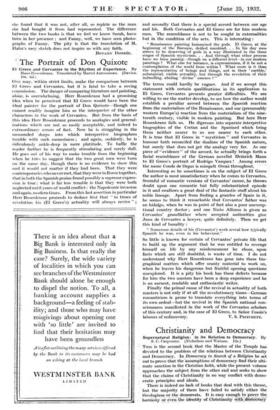:Ile Portrait of Don Quixote
ONE may, within strict limits, make the comparison between El Greco and Cervantes, but it • is fatal to take a roving commission. The danger of comparing literature and painting, alone, is overwhelming. Herr Rosenkranz had a promising idea when lie perceived that El Green would have been the ideal painter for the portrait of Don Quixote—though one cannot readily imagine him as the interpreter of the other characters in the work of Cervantes. But from the basis of this idea Herr Rosenkranz proceeds to analogies and general- izations which are not so easily acceptable, and indeed to extraordinary errors of fact. Now he is struggling in the unsounded deeps into which interpretive biographers - tumble with such earnestness ; and again, suddenly, he is ridiculously ankle-deep in mere platitude. To baffle the res.der further he is frequently stimulating and rarely dull. Ile goes out of his way to make trouble from the beginning wheb lie tries to suggest that the two great men were born on the same day, though there is no evidence to show this, and it would not matter if they had been. That they were contemporaries who never met, that they were in Rome together, that in both the Spanish genius found possibly a supreme expres- sion is true; what is far less tenable is that they were both neglected until years of world conflict : the Napoleonic invasion and again, modern times. From this last assertion in particular Herr Rosenkranz proceeds to deduce first that " in times of revolution his (El Greco's) actuality will always revive" ;
and secondly that there is a special accord- between our age and his. Both Cervantes and El Greco are for him modern men. The resemblance is not to be sought in externalities but in the condition of the arts. This is interesting :
"Renaissance painting humanized the gods. El Greco, at the beginning of the Baroque, deified mankind. . . In his day men strove to be deserving of gods in a way illustrated in the three stages of Spanish mysticism. . . And through what other process have we been passing—though on a different level—in our modem paintings ? What else for instance, is expressionism, if it be not a contemplation of the world from within I What more is it than the representation of beings and things, not in their earthly; substantial, visible aetuality, but through the revelation of their indwelling, abiding ' divine ' essence I" The terms could hardly be vaguer. And if we accept this statement with certain qualificatiOns in its application to El Greco, Cervantes presents greater difficulties. We are willing to see the matter develop, to see how the author would establish a peculiar accord between the Spanish reaction from the materialism of the Renaissance, and our (presumably western Europe's) reaction from the materialism of the nine- teenth century, visible in modern' painting.' But here. Herr Rosenkranz fails us. He digresses into separate interpretive biographies of the Cretan and the Spaniard which bring them neither nearer to us nor nearer to each other. It is true that El Greco in " mysticism " and Cervantes in humour both reconciled the dualism of the Spanish nature, but surely that does not get the analogy very far. As one piece of "evidence" of the accord, he actually brings forth a facial resemblance of the Gerinan novelist Heinrich Mann to El Green's portrait of Rodrigo Vazquez' Among errors the name Conde de Orgaz is misspelt Orcii throughout.
'Interesting as he sometimes is on the subject of El Greco the author is most unsatisfactory when he comes to Cervantes. Scornful of romantic versions of Cervantes' career, he throws doubt upon one romantic but fully substantiated episode in it and swallows a great deal of the fantastic stuff about his noble lineage. Apart from finding a grandee of Spain in it, he seems to think it remarkable that Cervantes' father was an hidalgo, when he was in point of fact also a poor unexcep- tional country doctor ; and one Nuilo Alfonso is given as Cervantes' grandfather where accepted authorities give Juan de Cervantes a lawyer, quite definitely. Then we get this kind of banality :
"Numerous details of his (Cervantes') work reveal how typically Spanish he was, even in his behaviour."
So little is known for certain of Cervantes' private life that to build up the argument that he was entitled to revenge himself on life by any misdemeanour he chose, upon facts which are still doubtful, is waste of time. I do not understand why Herr Rosenkranz has gone into these bio- graphical matters which offer scanty material to work on, when he leaves his dangerous but fruitful opening questions unexplored. It is a pity his book has these defects because for him the two masters have been a deep experience and he is an earnest, readable and enthusiastic writer.
Finally the primal cause of the revival in actuality of both masters is not only if at all the revolutionary times—German romanticism is prone to translate everything into terms of its own ordeal—but the revival in the Spanish national con- sciousness manifested in the work of the Cervantes scholars of this century and, in the case of El Greco, to Sefior Cossio's


































 Previous page
Previous page